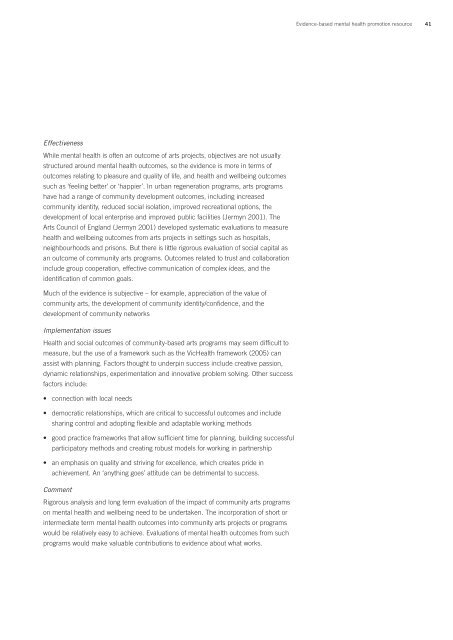Evidence-based mental health promotion resource - health.vic.gov.au
Evidence-based mental health promotion resource - health.vic.gov.au
Evidence-based mental health promotion resource - health.vic.gov.au
You also want an ePaper? Increase the reach of your titles
YUMPU automatically turns print PDFs into web optimized ePapers that Google loves.
<strong>Evidence</strong>-<strong>based</strong> <strong>mental</strong> <strong>health</strong> <strong>promotion</strong> <strong>resource</strong>41EffectivenessWhile <strong>mental</strong> <strong>health</strong> is often an outcome of arts projects, objectives are not usuallystructured around <strong>mental</strong> <strong>health</strong> outcomes, so the evidence is more in terms ofoutcomes relating to pleasure and quality of life, and <strong>health</strong> and wellbeing outcomessuch as ‘feeling better’ or ‘happier’. In urban regeneration programs, arts programshave had a range of community development outcomes, including increasedcommunity identity, reduced social isolation, improved recreational options, thedevelopment of local enterprise and improved public facilities (Jermyn 2001). TheArts Council of England (Jermyn 2001) developed systematic evaluations to measure<strong>health</strong> and wellbeing outcomes from arts projects in settings such as hospitals,neighbourhoods and prisons. But there is little rigorous evaluation of social capital asan outcome of community arts programs. Outcomes related to trust and collaborationinclude group cooperation, effective communication of complex ideas, and theidentification of common goals.Much of the evidence is subjective – for example, appreciation of the value ofcommunity arts, the development of community identity/confidence, and thedevelopment of community networksImplementation issuesHealth and social outcomes of community-<strong>based</strong> arts programs may seem difficult tomeasure, but the use of a framework such as the VicHealth framework (2005) canassist with planning. Factors thought to underpin success include creative passion,dynamic relationships, experimentation and innovative problem solving. Other successfactors include:• connection with local needs• democratic relationships, which are critical to successful outcomes and includesharing control and adopting flexible and adaptable working methods• good practice frameworks that allow sufficient time for planning, building successfulparticipatory methods and creating robust models for working in partnership• an emphasis on quality and striving for excellence, which creates pride inachievement. An ‘anything goes’ attitude can be detri<strong>mental</strong> to success.CommentRigorous analysis and long term evaluation of the impact of community arts programson <strong>mental</strong> <strong>health</strong> and wellbeing need to be undertaken. The incorporation of short orintermediate term <strong>mental</strong> <strong>health</strong> outcomes into community arts projects or programswould be relatively easy to achieve. Evaluations of <strong>mental</strong> <strong>health</strong> outcomes from suchprograms would make valuable contributions to evidence about what works.



